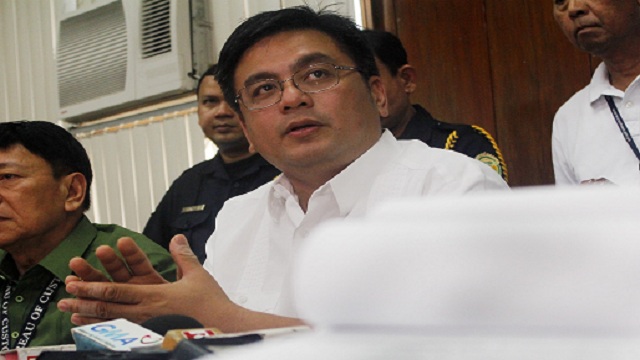SUMMARY
This is AI generated summarization, which may have errors. For context, always refer to the full article.

MANILA, Philippines – Malacanang does not consider the Bureau of Customs a hopeless case despite calls to abolish it to stop the alleged rampant smuggling and corruption in the agency.
“From what I understand from Commissioner Biazon, that was one of his suggestions,” Deputy presidential spokeperson Abigail Valte said in a radio interview on Saturday, April 13.
She was referring to Customs Commissioner Ruffy Biazon’s interview with with the Philippine Daily Inquirer whe he had discussed with President Benigno Aquino III the proposal to scrap the entire Customs and replace with an institution ran by private officials.
“But allow us to say that these discussions were initial and were just one of the many possibilities that are being discussed on how to improve Customs performance,” Valte said.
“There are many other options being considered. And again, if you look at any system and you want to improve it…you look at the different ways that is possible to do that. So that is one of the contents of the discussion,” she added.
Asked if the abolition of the Customs, if it would push through, could become a graceful exit for Biazon, Valte again answered “it’s just one of the many possibilities that is being explored.”
Loss of confidence?
Valte said plans to privatize Customs should also not be construed as a failure of the administration to carry out an effective anti-corruption campaign.
She said the agency should not be the sole gauge for the government’s anti-corruption efforts.
In fact, Valte said they had not been hiding there were those in government who continued to be involved in irregularities.
“Commissioner Biazon himself said they were looking at those belonging in Customs itself and we are not covering up for the misfits,” Valte said, adding those proven to be remiss in fulfilling their mandate would be held liable.
Valte said depsite the issues, President Aquino had not told them anything to mean he had lost trust and confidence in Biazon.
“The commissioner was being asked to respond to allegations and he anwered,” Valte said, referring to Biazon’s statement that he would step down only if the President asked him to.
Biazon said he had an initial discussion with Aquino about overhauling the Customs from top to bottom like what was done in other countries.
Critics have demanded the resignation of Biazon for allegedly failing to stamp out smuggling despite the Aquino administration’s emphasis on transparency and good government.
Radical change
The Customs Chief said he himself proposed abolition of the entire customs bureau to get rid of all the corrupt officials and employees in the agency.
Biazon cited the example of Peru, which, to defeat corruption and smuggling, abolished its custom department, put up a new one, adopted strict qualifications for hiring, and paid higher salaries to the new officers and employees running the new agency.
He said there must be complete automation of the system to minimize human intervention and on this front, the Philippines had been left behind by many countries.
Biazon also said that under the proposal being considered by the Aquino administration, the replacement of the customs bureau will not be dependent on the national government for its budget. Instead, it will retain three percent of its tax and duty collections to finance its own operations.
That way, Biazon said, the new institution will not have to go to Congress every year to ask for budget approval, thus keeping itself free from the influence of politicians.
Moreover, the proposal states that, if possible, the employees of the new organization will be exempt from the Salary Standardization Law. With the exemption, it can pay its employees relatively higher salaries than what regular government agencies pay their staffs.
Giving high salaries is one way of shielding customs officers and employees from temptation, Biazon said.
He said that if he had his way, the customs bureau would no longer hold auctions to dispose of forfeited goods. Having a private group do that job is a prudent idea, he said. It will also defeat the “auction syndicates,” dummies of smugglers who forfeited the goods. With the syndicates being allowed to top the auctions by corrupt customs officers, the smuggled goods go back to the smugglers.
“One of the benefits of this proposal is the expedited disposal of forfeited cargos. Another is the process of auction becomes transparent,” Biazon said. “If the function is delegated to the private sector, customs would be able to concentrate more on its other vital functions.” – Rappler.com
Add a comment
How does this make you feel?
There are no comments yet. Add your comment to start the conversation.